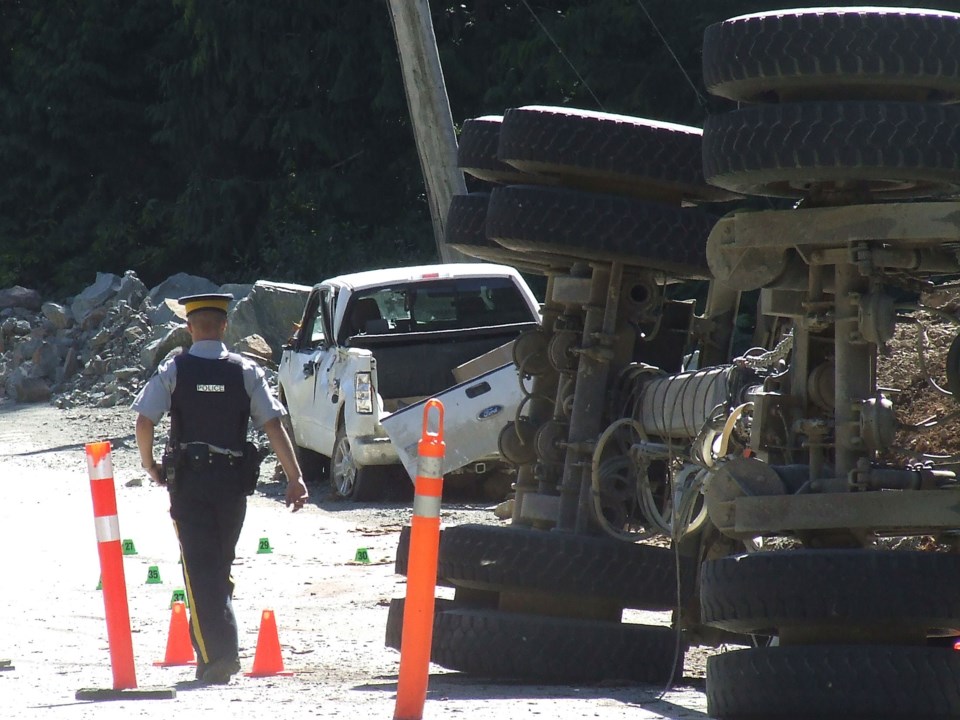Two people were injured Monday morning, Sept. 10, when a southbound logging truck rolled over into oncoming traffic on Highway 99. One of the injured was airlifted to Vancouver.
According to reports, the truck rolled over onto two vehicles, sideswiping a pickup truck and dumping its load onto a small Ford. The driver of the pickup was not hurt, but the occupants of the Ford were injured by falling logs. The female driver had extensive injuries to her arm that required surgery, while her passenger was treated at the Whistler Health Care Centre for unspecified but non-life threatening injuries.
The accident closed the highway for more than three hours Monday morning, before it was reopened to single-lane alternating traffic. There was also a short closure on Monday afternoon as crews removed the logs and damaged vehicles from the scene.
The RCMP are investigating the cause of the rollover.
The incident took place on the same stretch of road, just 2 km south of Function Junction, where another logging truck rolled into the path of a northbound bus in February. At least one other logging truck has lost its load in that area over the past two years.
As well, there was another logging truck rollover to the north of Whistler in the spring, with Monday’s incident making it three in the past nine months.
The Sea to Sky Regional Police Service has taken steps since Whistler Council brought the issue of logging truck accidents forward earlier this year, but say they are constrained by resources.
“It was some unfortunate timing in a sense with this latest incident, as we have a commercial vehicle inspector coming up to Whistler for three days later this month to give officers special training,” said Corporal Scott Bowden of Sea to Sky Traffic Services.
The goal is to train officers to stop and inspect commercial vehicles, including logging trucks, and to be able to assess whether loads are properly distributed and secured, as well as to weigh vehicles using portable scales they plan to borrow from the North Vancouver detachment.
But even with additional training for officers, Cpl. Bowden says it is still an issue of manpower.
“We do have plans to increase our day-to-day enforcement, but there are so many levels and areas of enforcement that it is tough to hit all of them,” he said. “However, being mindful of this we’re also in the process of setting up a meeting to try and get as many owners and operators of logging trucks together and go over our concerns. We also want them to know that the enforcement is out there, and is being stepped up.
“We do stop logging trucks and commercial vehicles that are in infraction of the Motor Vehicle Act on a regular basis, and if we see any offence with a commercial or logging truck we will stop and deal with them in an appropriate matter.”
Whistler Mayor Ken Melamed said the highway is the lifeblood of the resort, and that the Resort Municipality of Whistler has voiced concerns to the RCMP and other levels of government regarding the number of accidents and closures.
“Council has raised it as a pressing concern, and (Councillor) Ralph Forsyth brought it up for the second time a couple of meetings ago,” he said. “As this is the third accident in fairly short order, council is really going to be pressing the RCMP for greater enforcement on the roads, and greater compliance by the industry, as well as just greater respect for safety on the highway.
“We also understand that the highway reconstruction will take out some of these dangerous curves where two of these incidents have happened, but we still want people to drive respectful of the speed limit, the road conditions, and the loads they are carrying.
“This issue of safety and road closures is an issue that has been with us all year. It’s clear that the highway is the lifeblood of the town… and we need to keep the road open. The province recognizes the importance of this, which is why they’re building a $600 million highway, and why we’ve scheduled the construction highway closures to have the least amount of impact. Keeping it open means more enforcement, as well as being more proactive in preventing these types of accidents from happening.”
According to Inspector Norm McPhail of the Sea to Sky Regional Police Service, the latest rollover is still under investigation. If the evidence warrants it, they will submit a report to the Crown recommending charges, but otherwise the information will be sent to the appropriate levels of government with recommendations how to make trucking and the highways safer.
The section of highway where the two rollovers have occurred this year will be rebuilt as part of the Sea to Sky Highway Improvement Project, but McPhail says they do plan to increase enforcement in the area.
“Right now our provincial highway patrol group is five members, but we’re trying to expand those numbers,” he said. “The plan is to have more officers doing checks of logging trucks, and more training for the officers on how to do inspections.
“It’s not just logging trucks, but all commercial vehicles that are using the road. In the last year we’ve had a series of accidents with commercial vehicles, some that were driving in icy conditions without the proper chain-up, and there is an ongoing focus on how to deal with the issue.”
According to McPhail, accidents like rollovers should not happen when the road is clear and the driver is following posted speed limits.
The overall safety of logging trucks is being addressed at the provincial level by the B.C. Forest Safety Council, Worksafe B.C., and ICBC, as well as the United Steelworkers union that represents forest industry workers. They are in the process of creating new certifications for drivers, as well as improving overall working conditions.




